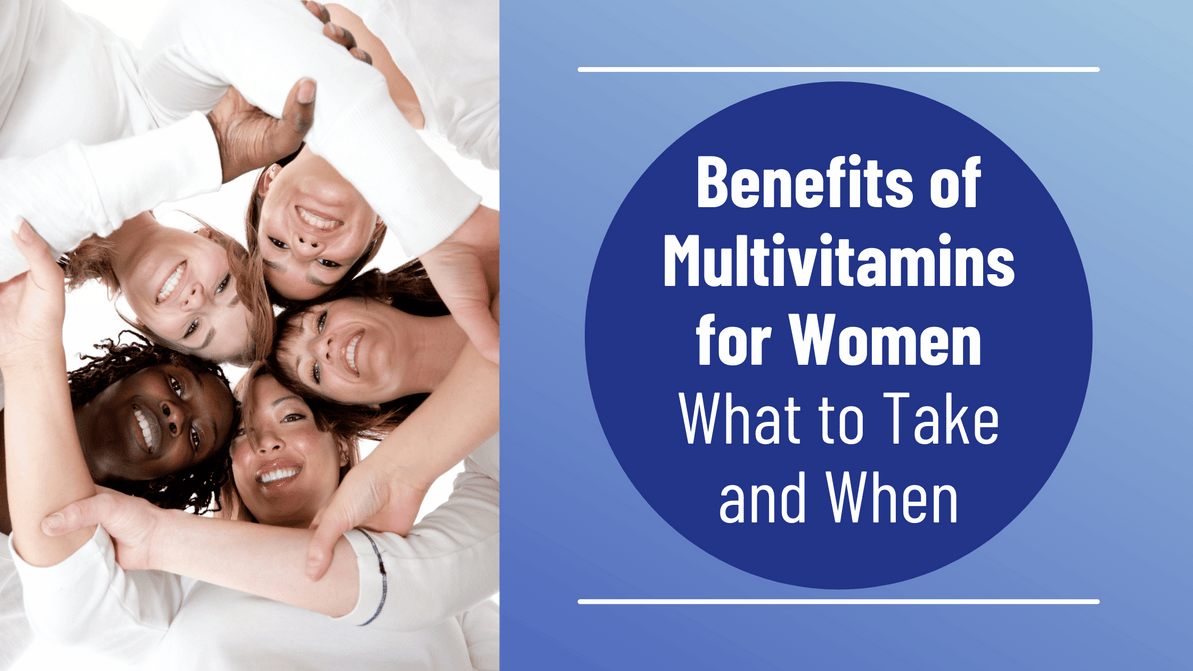Benefits of Multivitamins for Women—What to Take and When
The world of supplements is vast, and if you’re like most people, a bit confusing and intimidating to sort through all of the information. With approximately 29,000 supplements on the market today (just in the US) and around 1,000 more added to the mix annually (also just in the US), you’d hardly be to blame. [According to the FDA]
Whether you’ve been taking supplements for years “just because” or are asking yourself whether you should be, follow our Supplement Series for an overview of the whats, whys, and whos of individual supplements. (And please read our disclaimer at the end of this post.)
And even within the world of multivitamins, there’s been a lot of rapid growth over the past few years. Need energy? There’s a multivitamin for you. Need to sleep better? There’s a multivitamin for that too. Are you a man needing a boost to push through strength training? You have plenty of options. Are you a woman? There are many supplements available for you. But what are the benefits of multivitamins for women? Do you really need to take one?
Not everyone needs to take a daily multivitamin. You can get most of your nutrients from a healthy, balanced diet. But sometimes that’s not possible. Plus, there are certain moments in life when your body needs a little help. And that’s especially true for women. So if you’re a woman wondering when and why you should consider a multivitamin, this article is for you.

When should women consider taking a multivitamin?
In an ideal world, we would get all our nutrients from food. Unfortunately, the reality is sometimes different. Going through periods of intense mental and physical stress, traveling, or various diseases can leave us depleted.
Plus, women go through many hormonal changes throughout their lives. In those times, our bodies may need more support than usual. Before and after giving birth are 2 typical times in a woman’s life when supplementation can be beneficial.
Menopause is another stage when your body goes through a lot of changes that you may not be able to support with foods alone. For example, you’re more at risk for osteoporosis, so supplementing may help reduce those risks.
Are women’s multivitamins different from general multivitamins?
Most of the time, their composition is slightly different. Women’s multivitamins often contain more calcium, folate, or magnesium.
A lot depends on who exactly they’re for. Prenatal vitamins will have more folate. Those formulated for postmenopausal women will most likely contain more calcium and vitamin D but not so much folate.
Others may contain other supplements for hormonal support. This includes inositol, which can be helpful for women with polycystic ovarian syndrome (PCOS), or black cohosh, which is said to help ovulation and reduce menopausal symptoms.

Benefits of multivitamins for women at different life stages
When taken correctly, multivitamins can have many benefits for women. From higher energy to better sleep and improved hormonal health, they can positively impact your life.
General benefits
Regardless of your age, multivitamins can positively affect your health.
- They keep you energized. Let’s face it. We all need a boost of energy now and then. Caffeine or tea might do the trick for a while, but when lack of energy becomes a constant problem, you might need something more. Supplements, especially B vitamins, can offer that much-needed boost.
- They’re helpful for vegans.Vegan diets can offer you plenty of vitamins and minerals, but your body may need a little help sometimes. For instance, vitamin B12 is nearly impossible to get on a vegan diet, so a supplement can come in handy.
- They offer the nutrients you need when you’re on a diet. Vegan or not, many women choose to go on a restrictive diet at some point. While that’s not a great option for your health, if you decide to do it, you can replace the missing nutrients through supplementation. Remember that such diets are not recommended long term, even if you take a daily multivitamin.
- They support your body in times of stress. Like taxes, stress is inevitable nowadays. Unfortunately, it can take a massive toll on your body. Insomnia, lack of energy, and low immunity are only some problems chronic stress can cause. While a multivitamin won’t make your problems disappear, it can help your body push through difficult times by boosting energy and immunity.
- They may help with hormonal imbalances. Some vitamins, minerals, and even herbal supplements can improve hormonal balance. For instance, there’s some evidence Vitex may help lengthen the luteal phase in women with luteal deficiency. Magnesium could also help women with irregular cycles when stress is the root cause.

Prenatal vitamins
Many practitioners recommend prenatal vitamins before and during pregnancy. Should all women take them? Like with all multivitamins, getting nutrients from food is best. But since that’s not always possible, supplementing can be helpful.
There are two key ingredients with crucial benefits in most of these vitamins:
- Folate, which may help prevent neural tube defects.
- Iron, which supports the development of the fetus and the placenta.
Other ingredients you may want to look for include:
- Vitamin D and calcium. Both support bone health and aid the baby’s teeth and bone development during pregnancy.
- Omega-3 fatty acids. While not an essential vitamin, omega-3 fatty acids can support the baby’s brain development. So, a supplement might be a good option if you don't eat fish.
Postnatal vitamins
Caring for your body doesn’t stop once you give birth. The postnatal phase, especially if you’re breastfeeding, can be especially challenging.
Pregnancy can deplete your body of nutrients, such as vitamin D, calcium, or iron. Breastfeeding can also cause a nutrient deficiency in vitamins A, B1, B2, B6, B12, and more.
In other words, postnatal vitamins can help:
- Replenish your body with nutrients after pregnancy
- Support your body while you’re breastfeeding
- Help boost your energy and cope with the demanding schedule of having a newborn
- Support your immune system

Supplements to help during and after menopause
Menopause is a natural state in any woman’s life. You’ll start experiencing the first symptoms in your late thirties or forties. As estrogen and progesterone levels drop, you may notice hot flashes, vaginal dryness, mood swings, and more.
As menopause sets in, your nutrient needs change. Low estrogen levels pave the way for osteoporosis, weight gain, hair loss, urinary incontinence, and even heart disease.
Postmenopausal supplements have various nutrients. Some contain high doses of those vitamins and minerals women are often deficient in during this time. Others are formulated with specific issues in mind, such as supplements to help fight against osteoporosis.
Here are some vitamins and minerals that help you during this phase of your life.
- Vitamin B12. As you age, the body loses the ability to process B12. However, this is a crucial vitamin for your health at this stage as it helps with bone health and neurological function, among other things.
- Vitamin D and Calcium. Both are essential for bone health and may be crucial in reducing your risk of bone density loss.
- Vitamin E. Helpful in fighting weight gain, depression, and even heart disease, vitamin E is also a powerful antioxidant.
- Zinc and Vitamin C. They support the immune system, helping your body fight various diseases.
If possible, work with a physician to find your best option. Not everything sold as a supplement for menopause is great for everyone. For instance, a 2002 study showed vitamin A might be linked to a higher risk of fractures in postmenopausal women.

Do multivitamins for women have any side effects?
While there are many benefits of multivitamins for women, they can also have side effects when taken incorrectly.
Digestive issues are one of the most common complaints. You can usually fix this by changing the timing of your multivitamin. For example, if you take it on an empty stomach in the morning, try taking it with some food.
In rare cases, multivitamins could also lead to hormonal imbalances. This is true for both herbal supplements and those containing vitamins and minerals. Let’s take melatonin as an example.
There is some evidence that melatonin could affect estrogen levels. For most women, this is harmless. But for someone struggling with high estrogen, there could be some unwanted effects, including menstrual irregularities.
Vitex, an herb found in many vitamins for young women with irregular cycles, isn’t great for everyone. For example, women with PCOS who struggle with chronically high LH (luteinizing hormone) might find Vitex makes their hormonal imbalances worse.
You should also avoid taking multivitamins that give you much more than the recommended dosage of various vitamins and minerals. Unless your doctor specifically recommends a very high dose to fix a deficiency, stick to the daily recommended amount.

Key takeaways
Multivitamins can support women’s bodies in various stages of their life. They may:
- Help with hormonal imbalances
- Ensure a healthy pregnancy
- Support the body after giving birth
- Fix nutritional deficiency after menopause
- Help you push through stressful or challenging times
- Give you a nutrient boost while you’re on a diet
And if you’re looking for a multivitamin to support you wherever you are on your journey, check out our shop for some top-quality supplements.

Health/Medical Disclaimer
This blog post does not provide health or medical advice. This blog post is for informational and educational purposes only and is not a substitute for professional health or medical advice. Before taking any actions based upon such information, we encourage you to consult with the appropriate medical and healthcare professionals. We do not provide any kind of health or medical advice. The use or reliance of any information contained on this blog is solely at your own risk.
Sources
https://pubmed.ncbi.nlm.nih.gov/31925443/
https://pubmed.ncbi.nlm.nih.gov/29433770/
https://pubmed.ncbi.nlm.nih.gov/29296279/
http://jama.jamanetwork.com/article.aspx?articleid=194525
https://pubmed.ncbi.nlm.nih.gov/29127547/
https://pubmed.ncbi.nlm.nih.gov/27925712/
https://pubmed.ncbi.nlm.nih.gov/22972105/
https://pubmed.ncbi.nlm.nih.gov/25524718/
Recent Posts
-
Are sunscreen ingredients harmful?
Sunny days can bring a lot of fun. Going out for a swim, spending time in nature, or relaxing on the …18th Mar 2024 -
The Veggie Debate: Does Cooking Vegetables Destroy Nutrients and the Best Ways to Cook Them
Vegetables are one of the healthiest foods you can choose. Some people downright hate them, while so …4th Mar 2024 -
Best Foods for COVID Recovery and Prevention
A few years ago, a new virus took the world by surprise. COVID-19 may look like the flu on the surfa …19th Feb 2024




